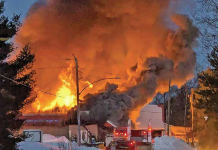A national restructuring of support services for people suffering with suicidal thoughts and tendencies is a “game changer” according to Ellen Watkins, director of corporate services at Canadian Mental Health Association Haliburton, Kawartha, Pine Ridge.
The local chapter was chosen to be one of 45 national providers for a new 9-8-8 suicide crisis helpline, which recently launched. It replaced regional call operations, previously operated in HKPR through the Four County Crisis community response program, providing people with around-the-clock access to professional support.
“What this means is if someone is experiencing thoughts of suicide or extreme emotional distress… there will always be someone available to answer your call,” Watkins said.
Calls made to 9-8-8 are immediately routed to the closest geographically available agent, using an algorithm that distributes based on area code.
“Calls that are meant to come to us, will do so. Having the ability to understand both the social and environmental context of our callers is important,” Watkins said. “The other piece is we’ll be able to connect individuals in real-time to local resources.”
As part of the restructuring, the HKPR chapter is tripling the number of on-theground mental health workers – from four to 12 – who will be available to travel across the region to meet with people most in-need face-to-face. Referrals will be made for anyone who calls the 9-8-8 service, with Watkins saying the goal is to establish an in-person connection within 48 hours.
Watkins noted there had been a spike in demand for CMHA services in recent years, which she attributes to the COVID-19 pandemic.
“Loneliness and lack of connection is often at the core of what drives changes or increases [in numbers]. People were more harshly exposed to what that all looks like through COVID,” she said, noting suicide numbers were also up.
“For people who are contemplating ending their life, three things are occurring – there’s suicide ideation, there’s an opportunity, and there’s no one around to interrupt the opportunity. We’re hoping, through 9-8-8, for those who have the idea and opportunity, there may be a spark of ‘maybe I would like someone to help me interrupt what I’m thinking of doing’,” Watkins added.
According to the CMHA national database, around 4,500 people die every year as a result of suicide. Last year, the HKPR chapter assisted 479 people through its crisis intervention supporting services. This year, Watkins said the organization is anticipating serving around 800 people through its new brief mental health services team.
“For people in Haliburton, this is a step change for us in terms of the level of support we’ll be able to provide in a community that is not as resource-rich as some others within the region,” Watkins said. “We feel that by improving the number of workers we have available [on the road], being able to support people in place in Haliburton County will change the momentum [towards more positive outcomes] and make a difference in people’s lives.”
Temporary housing bolstered
CMHA HKPR is also expanding its Safe Beds program, now operating in downtown Peterborough.
The space provides short-term temporary housing for six people and is available to anyone going through a mental health crisis that resides in the HKPR region. Intake is usually by referral and after HKPR staff have conducted a thorough assessment. Stays are typically capped at 10 days.
Watkins said, while roughly 100 km away, the space is available to County residents.
“Constituents from Haliburton are very welcome. We can help with transportation if necessary,” she said.
For more information, visit cmhahkpr.ca, call 705-748-6711, or email info@cmhahkpr. ca.
CMHA’s Ellen Watkins believes the restructuring of suicide support services is a win for the community





